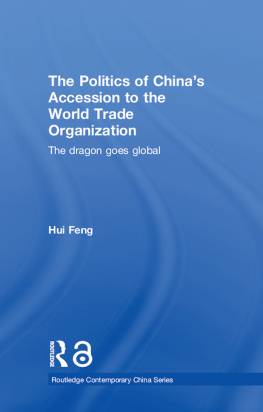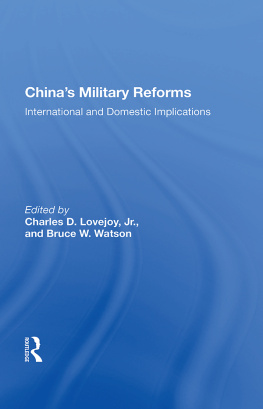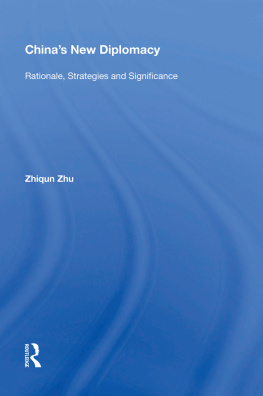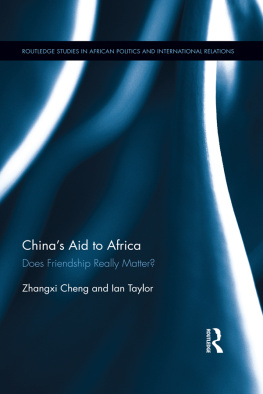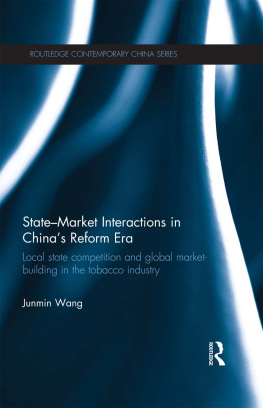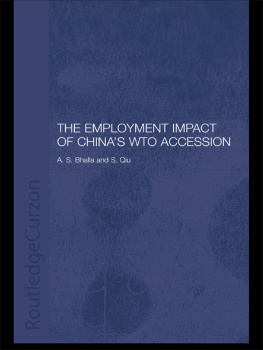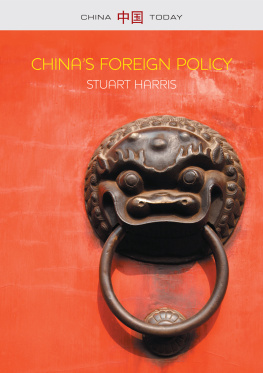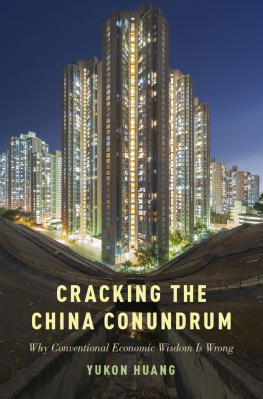The Politics of Chinas Accession tothe World Trade Organization
Chinas accession to the World Trade Organization marked a major milestone in the countrys return to the international economic regime. However, although much research has been carried out into the economic impact of Chinas WTO membership, Chinese policy-making processes have in the main been ignored. The Politics of Chinas Accession to theWorld Trade Organization tackles this omission by providing an inside look at Chinese WTO accession negotiations and establishing a systematic political economy model in analysing Beijings decision-making mechanisms.
Grounded on a series of interviews with Chinese government officials directly involved in the policy-making process, the book argues that Chinas WTO policy making is a state-led, leadership driven, top-down process. Feng explores how Chinas determined political elite partly bypassed and partly restructured a largely reluctant and resistant bureaucracy, under constant pressure from an increasingly globalized international system. In addition, local governments and societal actors other than the large state enterprises were for the most part excluded from the policy arena. The Chinese political leadership was, therefore, the initiator and driver of Chinas WTO quest, steering the accession to the end.
Addressing Chinas accession to the WTO from a political analysis perspective, the book provides a theoretically informed and intriguing examination of Chinas foreign economic policy-making regime. The Politicsof Chinas Accession to the World Trade Organization sheds light on the contemporary debates relating to state and institutionalist theory and provides new and useful insight into a significant development of this century.
Hui Feng is a Research Fellow in the School of Political Science and International Studies at the University of Queensland, Australia.
Routledge contemporary China series
- Nationalism, Democracy and National Integration in ChinaLeong Liew and Wang Shaoguang
- Hong Kongs Tortuous Democratization A comparative analysis Ming Sing
- Chinas Business Reforms Institutional challenges in a globalised economy Edited by Russell Smyth and Cherrie Zhu
- Challenges for Chinas Development An enterprise perspective Edited by David H. Brown and Alasdair MacBean
- New Crime in China Public order and human rights Ron Keith and Zhiqiu Lin
- Non-Governmental Organizations in Contemporary China Paving the way to civil society? Qiusha Ma
- Globalization and the Chinese CityFulong Wu
- The Politics of Chinas Accession to the World Trade Organization The dragon goes global Hui Feng
The Politics of Chinas
Accession to the World Trade
Organization
The dragon goes global
Hui Feng
First published 2006
by Routledge
Published 2017 by Routledge
2 Park Square, Milton Park, Abingdon, Oxon OX14 4RN
711 Third Avenue, New York, NY 10017, USA
Routledge is an imprint of the Taylor & Francis Group, an informa business
Copyright 2006 Hui Feng
Typeset in Times by Wearset Ltd, Boldon, Tyne and Wear
The Open Access version of this book, available at www.tandfebooks.com, has been made available under a Creative Commons Attribution-Non Commercial-No Derivatives 4.0 license.
British Library Cataloguing in Publication Data
A catalogue record for this book is available from the British Library
Library of Congress Cataloging in Publication Data
A catalog record for this book has been requested
ISBN 978-0-415-36921-3 (hbk)
In memory of Shouci Tao
Illustrations
Figures
Tables
Acknowledgements
Chinas return to the international economic regime and the gradual internationalization in the last two decades has been arguably one of the key events in the late twentieth century. As a Chinese national, I, myself, witnessed the drama of economic opening and am part of this fascinating story of going global: after finishing my Masters study in international relations at Peking University, I worked for a Canadian law firm practising in Beijing before going to Australia to fulfil my academic aspiration as a PhD candidate and to continue my spiritual journey of inquiring the process and implications of Chinas deep integration into the international regimes.
This book builds upon the comparative work that I developed in my PhD thesis in the School of Political Science and International Studies at the University of Queensland, Australia. In writing this book, I am greatly indebted to a number of people without whose help and support its completion would have been impossible. First of all, I am mostly grateful to my supervisor and mentor, Stephen Bell. As a student new to the field of political economy, my research and publication could not have been in the current form without his continuous patience, guidance and encouragement as well as his invaluable advice and comments. His insights and personality have had a great influence on my academic life. I would also like to extend my thanks to Yong Wang and Dennis Woodward, whose critical reading and innovative suggestions on my thesis are incorporated into the manuscript. Mark Beeson and David Hundt provided constructive comments to earlier versions of the manuscript in my seminars, which are most appreciated.
My field trip to Beijing in August 2002 benefited from communications with a number of Chinese scholars, particularly with Yong Wang (School of International Studies at Peking University) and Honghua Men (Central Party School). My thanks also go to friends who arranged and coordinated the interviews with Chinese government officials but who have to be kept anonymous for political reasons. Although the interviewees also requested anonymity, their contributions must be acknowledged.
Over the years I have benefited from discussions with many scholars and friends whose contribution to this volume are important but cannot often be singled out individually. Nevertheless, I want to make special mention of Bill Tow, C. L. Chiou, Mark Ottor, Jean-Louis Durand, David Ip, Lai Chi-kong, Vivian Fung, James C. P. Chang, Gabriela West, Alexandra Copley, Bongus Adhi Chandra, Lloyd Fan and Hong Chen. My thanks also go to Tony Bunny, Timothy Scott and Roslyn Nicol who offered computing and administrative support for this research, and the School of Political Science and International Studies and the Graduate School of the University of Queensland which provided valuable resources and funds.
Stephanie Rogers and Helen Baker at Routledge guided me through the publication process, and have put tremendous efforts into securing this project. The anonymous readers of an early version of the manuscript added valuable perspective. Any remaining errors in this book, however, are my own responsibility.
Special acknowledgement must be made to my whole family, especially my wife Qian Kong, for her love, care and tolerance. Her spiritual support is indispensable and all the excitement and laughter we have shared constituted the most precious memories of my life.

